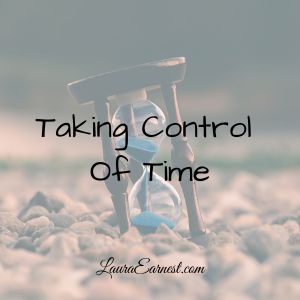Every year or so I realize that I am once again on the path of frittering away large amounts of time. This is usually due to bad habits that have snuck up on me, and also because I am simply not paying close attention. Once I realize that things are going down that unproductive path – and that I am spending time doing things I really don’t want or have to do – I start taking control of time.
Here are the ways that I reset and start taking control of time.
Saying No
This has been the biggest help when it comes to managing my time. By cutting out the things that are not important, I leave more time for the things I want to do. By cutting back on extraneous outside commitments, I found time for writing more. By putting away certain hobbies I didn’t enjoy, I made more time for those I did.
I also did this on a smaller level with the hobbies. I committed to myself that I would only do one project at a time. This actually accelerated the finish rate of my craft projects.
Stop Hitting Snooze
This is a bad habit, and can lead to too much extra time snoozing. The quality of sleep you get during that 9 minutes between alarms isn’t good, anyway.
The thing with this one is that it is a symptom rather than a cause of wasted time. I hit snooze because I don’t want to get out of bed for one of two reasons: it is too cold, or I am too tired. I set the thermostat to warm up the house so it isn’t cold, and make it a priority to get enough sleep. Addressing the underlying cause usually works to get me past the snoozing.
Put Big Tasks First
I try to tackle the big tasks first within context. Obviously, if the thing I consider the big task in my life conflicts with what my employer considers the big task, and I am at work, I should probably do what the employer wants. When I am paid to produce code, it isn’t good to be working on my novel.
However, if I have little tasks that can be knocked out quickly, it gives me a morale boost to see those done. I also find that getting several quick “wins” under my belt first thing in the morning allows me to keep up the momentum.
Ignore The Irrelevant
Easier said than done, don’t yourself get distracted. I find that this does allow more time by cutting down on the unimportant; however, this generally means I resort to technological means to limit distractions (turning off IM and email, installing software to keep me on track)
I use Freedom, and iOS screen time limitations as my primary tools to keep me focused.
Plan Your Week and Day
To me this is the most important way to control my time. If I know what is going to happen the next day, I am more prepared for it. A day with few tasks will mean a more relaxed pace; one with a lot means I need to move a little faster.
Before I read Tranquility By Tuesday, I never bothered with a weekly plan. Now I can’t live without it.
Manage Your Energy
Fueling your body with junk causes the finely tuned machine to work at sub-optimal performance. This in turn leads to less efficiency in tasks, or possibly a total shutdown as you go to take a carb-induced nap. Feed your body nutrition, and you will have better control over time.
Lower Your Expectations
Lower your expectations of what you need to get done, so you have time for recreation. Recreation is time to re-create yourself. This also applies to the pace you may apply to your tasks at hand. Slow down and enjoy.
Use A Timer
A timer can be used to stay on track and keep you moving forward when you might otherwise give into distraction. I use timers in many different ways to keep me on track.
Resurface and Check Coordinates.
From time to time, bring your head up from what you are doing, take a deep breath, and ask, “Am I still using my time in the best way?” This mini-check will allow you to see if you have gotten sidetracked and get you back on track.
Taking control of time is essential for productivity and personal fulfillment. By implementing these techniques, individuals can optimize their time usage, reduce stress, and create more space for activities that truly matter. The key is to be mindful of how time is spent and to make conscious choices that align with personal and professional goals.

